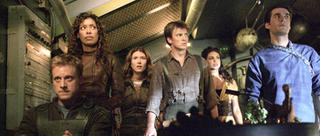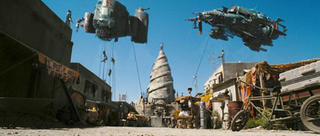I just saw one of the best sci-fi movies I’ve seen in years.
As a blogger, I was invited to screen the movie Serenity, based on the original Sci-Fi channel series Firefly. I wasn’t sure what to expect when I got there, like if this was going to be press and bloggers only or what, but it was just a preview showing with lots of people who won or got tickets somehow, so the audience was mostly random fans of the series I would imagine. Many people in the crowd were obviously excited to be there.
I can’t remember enjoying a motion picture like this in a while. This had all the originality of Star Wars and other Science Fiction greats, with terrific writing, snappy dialog, just the right amount of romance (that is, not too much at all, but just enough to give them depth and make cute remarks) and tons of great action sequences.
In my last post I mentioned that I was going into this cold, not having seen any of the series. My impression from the people at the theatre was that it worked well for those who had seen the series, but it also worked very well for those who hadn’t. In fact I thought it was just as good that I hadn’t seen the series, in that there were neat surprises at the beginning. The movie didn’t leave you guessing for long, and even though this was my first introduction to the characters, the dialog invites you right in and you feel like you know them within the first half an hour. Which is good, because the plot, and the action, never stops moving after that.
I was sitting here trying to think of something to criticize, but if I have to think about it too much, then there probably wasn’t much to criticize. Even the acting by pretty much all of the cast was top notch.
My favorite line from the movie, and one of the genius writing moves, was captured in the relationship of Captain Reynolds and Inara. They make it obvious that he had a relationship with her, even though she’s not in the movie yet. He gets a call from her asking him for help. After the call, he thinks it’s a trap, but Kaylee asks, “What if she just wants to see you?” Reynolds: “Did you see us fight?” “No.” “Trap.”
You’ll have to see it to see what I mean. They captured the entire relationship in that two minutes. Brilliant.
And that goes for all the one-liners in the movie. Brilliant.
On another note, let me say that when they rate this movie PG-13, they mean it. OK? Don’t bring your 5 year old, like the idiot sitting next to me. While the movie as a whole was brilliant, there are some truly terrifying scenes, and I am not even sure I’m ready for my 9 year old to see stuff like this yet. I have a 4 year old girl, and it horrified me to think of her having to watch this, like the girl three seats away from me.
There weren’t that many scenes like that, but it reminded me of the recent Lord of the Rings, in that I wouldn’t have let my younger child watch it because of the orcs and other evil things. But, of course, there were some idiots there with their 5 or 6 year old kids, forcing them to watch because they couldn’t get a sitter or something.
Anyway, go see this movie. I can’t wait to see the series, which is out on DVD, and catch up on all that I missed so far.

